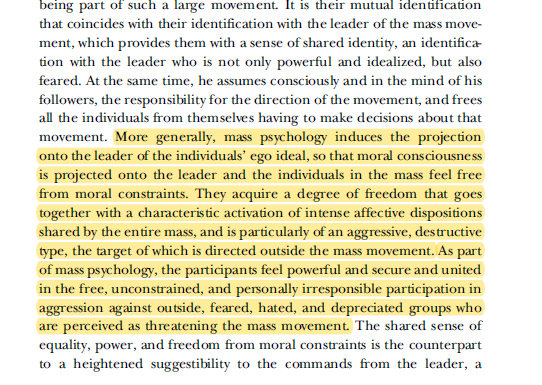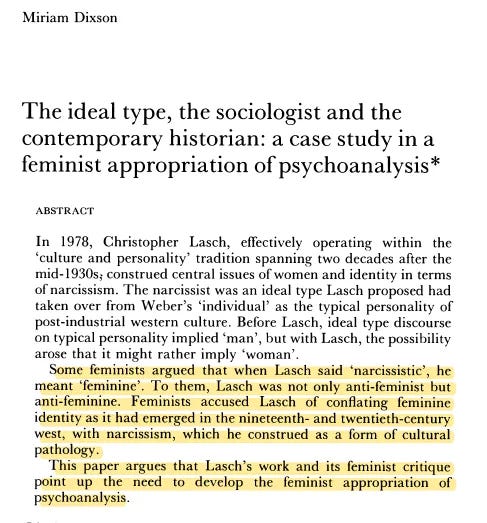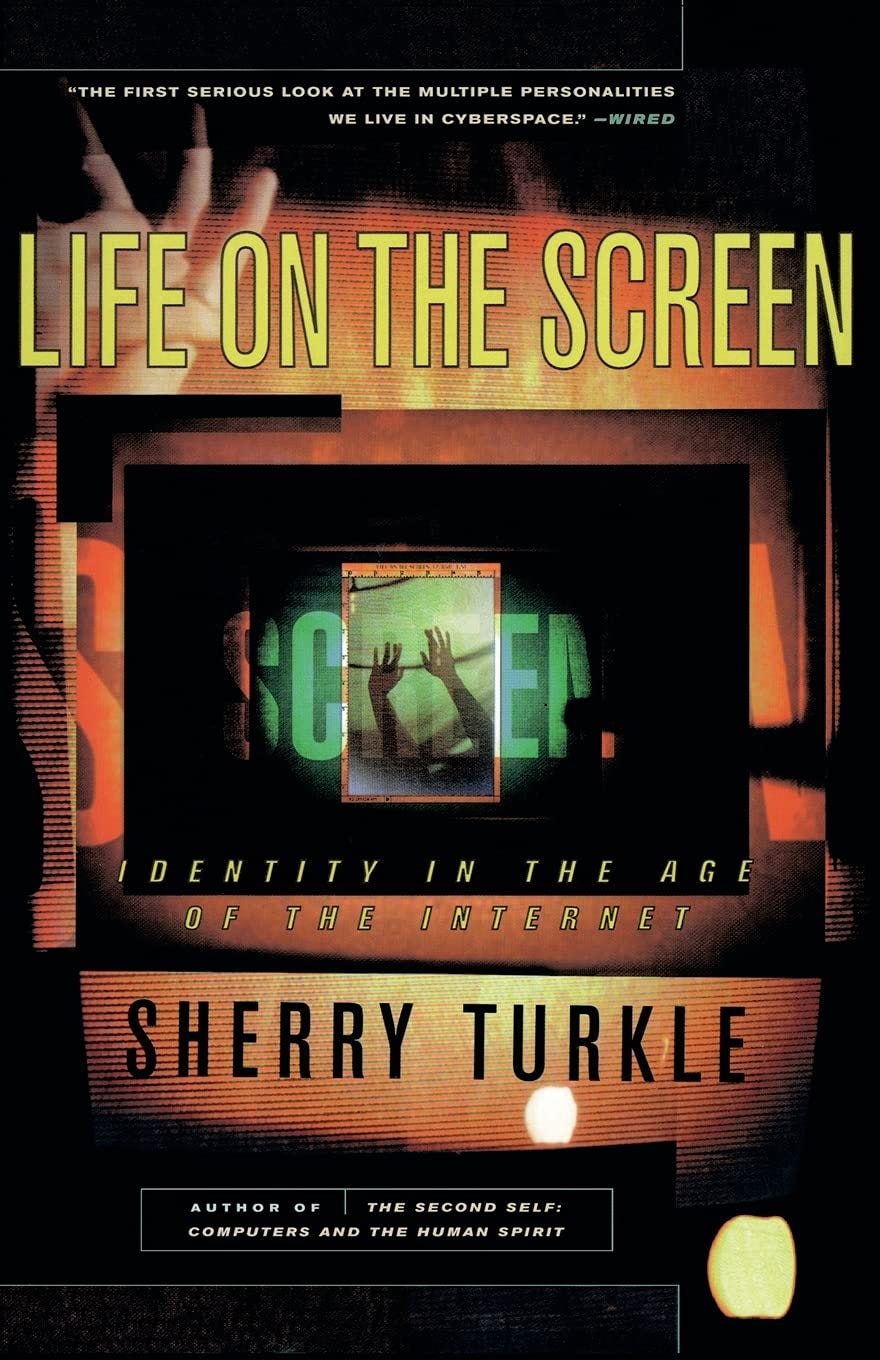"The Politics of the Psyche": Part 2
The New Left, Neo-Freudian Feminism, & Cultural Revolution
In the Part 1 of this series, I outlined how Christopher Lasch in The Minimal Self (TMS) used the conceptual framework of psychoanalysis to articulate a taxonomy of political ideology that he felt aptly characterized the then-emerging confusion of cultural politics in the early-to-mid 1980s (TMS was first published in 1984) and which I believe still directly applies—perhaps even moreso—to the prevailing political schizophrenia that characterizes our present-day cultural politics. Drawing on the work of American sociologist and personality psychologist Sherry Turkle, I believe Lasch’s use of psychoanalysis and psychoanalytic constructs, most directly the structure of the psyche in the form of the id, ego, and superego, provided “robust and useful, down-to-earth objects-to-think with” in making sense of our modern-day political chaos.
In Part 1, traditional notions of ‘right-conservative’ and ‘left-liberal’ were described in the context of the ‘superego’ and ‘ego’, respectively. In some contrast, the New Left was described briefly as the synthesis of the superego and ego ideal, and more nominally as “The party of Narcissus.” In part II, we look more closely at the evolution of this New Left ideology, it’s ideological origins and motivations, and why its namesake “Narcissus” evokes the notion of personality, and more broadly personality psychopathology.
The New Left as the Party of Narcissus
The Ideological Assault on the Ego: Neo-Freudian Feminism as Prodromal Woke Progressivism
In The Minimal Self, Lasch writes:
Freudian feminists advocate more than an expanded role for men in child-care. In company with many other kinds of feminists, they call for the collectivization of child-rearing, on the grounds not only that the nuclear family oppresses women but that it produces an acquisitive, aggressive, authoritarian type of personality…Because technological progress seems to have reached a dangerous dead end, it has become imperative to identify an alternative to the ‘patricentric’ personality in the form of a narcissistic, Dionysian, or androgynous personality type. Now that Promethean man apparently stands on the brink of self-destruction, Narcissus looks like a more likely survivor. What some critics condemn as cultural and psychological regression looks to many feminists like a long overdue ‘feminization of American society,’ as [Stephanie] Engel calls it.
As can be seen in the paper abstract below, the Freudian feminist argument for a ‘feminist appropriation of psychoanalysis’ was made explicit:
Continuing in The Minimal Self, Lasch notes:
The conservative analysis of modern culture, as we have seen, attributes the increase in destructive violence to a decline of the superego, while liberal critics attribute to a failure of the rational ego. Advocates of a cultural revolution point to the destructiveness of reason itself, and side, in effect, with the ego ideal in its striving to recapture a sense of oneness with the world [original narcissistic bliss]. [Feminist critic] Stephenie Engel makes this identification with the ego ideal explicit…In a carefully balanced passage, she pleads for a union of the ego ideal and the superego…
Engel, Stephanie. "Femininity as Tragedy: Re-examing the ‘New Narcissism’." Socialist Review, no. 53 (September-October 1980): 77-104.
As Jessica Benjamin writes in The Bonds of Love what Engel was calling for was a “less one-sided view of narcissism…that ideally one can find a balance between narcissistic aspirations and limitations.” In quoting Engel’s piece that “the call back to the memory of original narcissistic bliss pushes us toward a dream of the future” Benjamin points out that Engel was reacting in part to Lasch’s perceived nostalgia for paternal authority and the old gender hierarchical family present in his earlier work The Culture of Narcissism and noted, again quoting Engel’s piece, that what was Engel was proposing was that the [Lasch’s] denunciation of narcissism reflected a fear of “feminization.” More broadly, Benjamin, herself a feminist critic,— was even more strongly arguing than Engel—that Lasch’s targeting of narcissism and the weakening of paternal authority as the source of cultural selfishness and hedonism undermined the maternal contribution to individual development, as it associated narcissism with what Freud referred to as the ‘limitless narcissism’ of infancy.
“Analyzing the oedipal model in Freud’s original formulations and in the work of later psychoanalysts, we find this common thread: the idea of the father as protector, or even savior, from a mother who would pull us back to what Freud called the ‘limitless narcissism’ of infancy...According to recent cultural criticism, Narcissus has replaced Oedipus as the myth of our time. Narcissism is now seen to be at the root of everything from the ill-fated romance with violent revolution to the enthralled mass consumption of state-of-the-art products and the ‘lifestyles of the rich and famous.’ The longing for self-aggrandizement and gratification, in this view, is no longer bound by authority and superego to the moral values of work and responsibility that once characterized the autonomous individual…This social critique, best articulated by Christopher Lasch in The Culture of Narcissism, argues that the unleashing of narcissism reflects the decline of Oedipal Man.”
Benjamin further writes in The Bonds of Love that despite Lasch taking into account Engel’s more balanced approach to narcissism and her call for “a synthesis of the ego ideal and superego” in writing the The Minimal Self, he still undermined the feminine personae:
“It appears that Lasch was profoundly influenced by Engel’s critique. In his next book, The Minimal Self, he dropped his panegyric to the superego and adopted Chasserguet-Smirgel’s theory, including her understanding of the early conflict between separation and dependency. Lasch also accepted Engel’s case for a more balanced view of narcissism, but he balked at the gender implications of her argument. He rejected her charge that the psychoanalytic model of a ‘radically autonomous and individuated man’ devalues both femininity and primary connectedness to the world. Having cited approvingly Engel’s vision of the dual reign of superego and ego ideal, Lasch wants to know why feminists ruin a good argument by bringing up the matter of male domination.”
The above digression into Engel and Benjamin’s reactions to Lasch’s view of narcissism as outlined in both The Culture of Narcissism and in The Minimal Self is important to appreciate the degree to which neo-Freudian feminism shaped what Lasch would ultimately describe as the “party of Narcissus” in The Minimal Self. Today, the party of Narcissus is the radical progressive New Left. It is embodied by the engine of the contemporary Left: what James Carville described as the preachy female problem facing the Democratic party. Lasch presciently described the characteristics of exactly what Carville was speaking to in The Minimal Self:
Reinterpreted in the light of Marxism, feminism, and cultural anthropology, psychoanalysis allegedly undermined the idea that sexual differences are divinely or biologically ordained and therefore unchangeable, destroyed the myth of the patriarchal family and monogamous marriage, and laid bare the psychological dynamics by means of which the patriarchal family and a repressive sexual morality served to ‘maintain the stability of class society,’ in Fromm’s words…In their eagerness to bring psychoanalysis up to date and reconcile it with progressive social philosophies, the ‘neo-Freudians’ deleted whatever was distinctive and original in Freud’s work and ended up with a psychological theory that merely confirmed what every literate, humane, right-thinking man or woman already knew…In place of psychoanalysis, they served up [according to Brown] ‘lullabies of sweetness and light'.
Although both Norman O. Brown and Herbert Marcuse criticized neo-Freudianism, as Lasch notes, Marcuse had more in common “than he thinks with Fromm and especially with Wilhelm Reich” despite trying to confront the “profound pessimism of Freud’s later work” he
shares their "[Neo-Freudians] faith—part of the intellectual legacy of the nineteenth-century socialist movement and of the Enlightenment in general…will make life pleasant and painless. Eros and Civilization concludes with the pious hope that even death, like work and ‘other necessities,’ can ‘be made rational-painless’.
Nonetheless, the cultural revolutionaries (i.e., Marcuse and the neo-Freudian feminists) went one step further than the ‘neo-Freudians’:
As Marcuse tried to show, the transformation of the polymorphous perversity of the infant into genital sexuality already reflected the triumph of of the performance principle, as he called it, over the pleasure principle…A so-called sexual revolution that confined itself to genital pleasure could easily lend itself to new forms of domination. The task confronting the cultural revolution was not to set aside more opportunities for erotic indulgence, as a momentary release from the demands of alienated labor, but to eroticize work itself. The task was not to enlarge the domain of leisure but to abolish the very distinction between work and leisure, to make work into play, and to get rid of the aggressive, domineering attitude toward nature that informs the present organization of work.
Lasch skillfully illustrates in the above passages how neo-Freudians, especially neo-Freudian feminists, remade Freud's original work--which emphasized instinctual drives (i.e., biology)--into one focusing on 'social progress.' This feminist reformulation of Freudian theory is directly related to the emergence of 'social determinants of health' that ignore or outright deny biological and genetic contributions to physical and mental health. In short, one can interpret ‘social determinants of health’ as an ideologically corrupted public health agenda that is part of a larger cultural revolution towards socialism and communism.
Advocates of a cultural revolution echo the dominant culture not only in their confusion of practice with technique but in their equation of selfhood with the rational ego. Like their opponents, they see rationality as the essence of selfhood. Accordingly, they argue for a ‘resurrection of the body,’ for ‘feminine’ intuition and feeling against the instrumental reason of the male, for the alleged aimlessness of play, and for the ‘poetic imagination', as Bateson puts it, as a corrective to ‘false reifications of the self.’ The distinguishing characteristic of selfhood, however, is not rationality but the critical awareness of man’s divided nature. Selfhood expresses itself in the form of a guilty conscience, the painful awareness of the gulf between human aspirations and human limitations…Both the champions and critics of the rational ego turn their back on what remains valuable in the Western, Judaeo-Christian tradition of individualism (as opposed to the tradition of acquisitive individualism, which parodies and subverts it): the definition of selfhood as tension, division, conflict.
The below passage lays out in remarkable detail precisely the ethos and ideological undercurrents that organized the proponents of the “cultural revolution.” Most revealing in the context of Lasch’s psychoanalytic taxonomy is the last sentence quoting Shulamith Firestone in which, in describing the sexual revolution in Dialectic of Sex, she notes the “control and delay of ‘id’ satisfactions by the ‘ego’ will be unnecessary; the id can live free.” The frankness and directness of this statement, in which all personal restraint or self reflection is jettisoned, could not better describe the current ‘affirmation’ mentality of the mental health professional class, especially with respect to gender ideology, the consequences of which I believe will be catastrophic. “The id can live free” can be read as the freedom to live one’s authentic self even when it is disconnected from biological reality.
Norman O. Brown’s thanatology expresses a similar sentiment of complete liberation from external [biological] reality as that of Firestone’s:
“The central point of Brown’s later work, as I understand it—that the ‘distinction between inner self and outside world, between subject and object’ must be ‘overcome,’ as he writes in Love’s Body—is already implicit in Life Against Death.”
The contemporary consequences of this radical neo-Freudian feminist ethos is no better chronicled than by Canadian author and Professor of English Janice Fiamengo. In a recent piece she wrote about the paradox that while many feminists are outraged by the transgender lunacy and biological men invading women’s spaces, they fail to recognize that it is feminism itself, albeit the radical strand, that is responsible for enabling gender ideology and the notion of ‘gender fluidity’ that has allowed this invasion of women’s spaces to evolve.
Give a radical cultural revolutionary ethos that views ‘liberation’ from all biological constraints and the social interdicts premised upon them, it is not difficult to understand that this cultural revolutionary turn by the New Left, The party of Narcissus, is characterized by what renowned psychoanalyst and professor of psychiatry Otto Kernberg has described as ‘malignant narcissism’ in the leaders of cultural revolutionary mass movements:

The party of Narcissus—the contemporary radical progressive New Left—is characterized by an extreme variant of psychopathological narcissism that serves to galvanize and motivate its core base, liberating them from their own rationality and decision-making processes in their ideological quest for a “recaptur[ing] a sense of oneness with the world [original narcissistic bliss].” More generally, a shared identity characterized by a type of pseudo ‘hyper Christianity’ and virtuous-victimhood characterizes the Woke New Left. This ‘virtuous-victimhood’ and vulnerable narcissism, characterized by a brittle sense of self, low self-esteem, and especially negative affect and emotional instability—all captured within the Cluster B personality disorder behavioral phenotype—reflect what has become the contemporary synthesis of the ‘ego ideal’ and the superego. That is, an intractable mash-up of the superego that is striving for Oedipal independence and internalization of morality with an ‘ego ideal’ that seeks a narcissistic reunion of oneness with the world or sense of ‘infantile omnipotence.’ This is redolent of the classic ‘approach-avoid’ insecure-ambivalent relationship pattern, and aptly characterizes how the Woke progressive New Left relates to the larger cultural field and their existence within it.
A Wider Lens on New Left Cultural Revolution: Winnicott, Play, and Culture
The famous British pediatrician, psychoanalyst, and object relations theorist, Donald Woods Winnicott wrote a good deal on the role of play in the development of the child’s sense of self, but also in its relation to a healthy cultural milieu. In The Minimal Self, Lasch—for the first time to the best of my knowledge—explicitly links Winnicott’s work in relation to the political culture and the crisis of identity he believed was afflicting the cultural psyche. Indeed, in The Culture of Narcissism Lasch wrote:
The characteristic devaluation of language, vagueness as to time and place, sparse scenery, and lack of plot development evoke the barren world of the borderline, his lack of faith in the growth or development of object relations...
suggesting he believed culture was afflicted by a macrosocial crisis of object relations. In The Minimal Self, Lasch notes:
Winnicott’s theory calls attention to the importance of play in the development of a sense of selfhood. It shows the connections between play and art—hitherto demoted by psychoanalysis to the status of another substitute-gratification—and gives psychological support to the argument…that not only art, but all forms of culture contain an important admixture of play. ‘On the basis of playing is built the whole of man’s experiential existence,’ Winnicott argues. ‘We experience life in the area of transitional phenomena, in the exciting interweave of subjectivity and objective observation, and in an area that is intermediate between the inner reality of the individual and the shared reality of the world that is external to individuals.’ Culture mediates between the inner world and the outer world; and the ‘interplay between originality and acceptance of tradition,’ a feature of every form of cultural activity, strikes Winnicott as ‘just one more example…of the interplay between separateness and union.
As I noted on X, and also in my recent discussion with Jordan Peterson, Winnicott (as well as other post-Freudians such as Erik Erikson) understood the role of play not only for healthy selfhood and identity, but also that it mediated a healthy culture when predicated on transitional objects that linked the human need for autonomy in the context of relatedness. Relatedness not only to immediate caregivers, but relatedness to the larger cultural field that is external to individuals.
It is precisely this critical function of play that is being decimated in a world increasingly mediated on the screen via mass consumerism and niche ‘fandoms’ rather than by man-made objects in real life ‘IRL.’ Proper reality-testing is made impossible when social experience is increasingly mediated by ‘life on the screen.’
It is the intermediate realm of man-made objects, then, that threatens to disappear in societies based on mass production and mass consumption. We live surrounded by man-made objects, to be sure, but they no longer serve very effectively to mediate between the inner world and the outer world…the world of commodities takes the form of a dream world, a prefabricated environment that appeals directly to our inner fantasies but seldom reassures us that we ourselves have had a hand in its creation. Commodities cannot take the place of hand-made objects any more than science can take the place of practical worldly experience. Neither contributes to a sense of exploration and mastery.
The above quote illustrates why the infusion of gender ideology into Disney programming is so pernicious. Children's subjectivity is formed in relation to these consumer products via play and imagination which then degrades not only their sense of a coherent self, but also the cultural milieu in which their incipient personality psychopathology manifests in.
Seen in light of the party of Narcissus and the current cultural revolution:
[Norman O.] Browns thanatology and unpsychoanalytic view of play indicates that he has drawn the wrong conclusions from Freud’s essay Beyond the Pleasure Principle, that most puzzling of all Freudian texts…
The only way out of the impasse of narcissism is the creation of cultural objects, ‘transitional objects,’ that simultaneously restore a sense of connection with mothers and with Mother Nature and assert our mastery over nature, without denying our dependence on mothers or nature. It is precisely this compensatory activity, however, that is condemned by the party of the ego ideal—the party of Narcissus—on the grounds that substitute gratifications are inherently pathological.






Very interesting, lot's to draw on here. How much does Lasch go into Gregory Bateson specifically? I read Bateson's "Toward an Ecology of Mind" earlier this year and it's still fresh in mind. I've plenty of notes too.